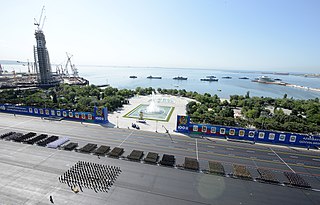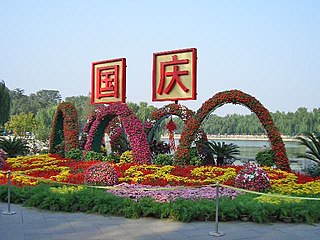
Arbor Day is a secular day of observance in which individuals and groups are encouraged to plant trees. Today, many countries observe such a holiday. Though usually observed in the spring, the date varies, depending on climate and suitable planting season.
June is the sixth month of the year in the Julian and Gregorian calendars. Its length is 30 days. June contains the summer solstice in the Northern Hemisphere, the day with the most daylight hours, and the winter solstice in the Southern Hemisphere, the day with the fewest daylight hours. June in the Northern Hemisphere is the seasonal equivalent to December in the Southern Hemisphere and vice versa. In the Northern Hemisphere, the beginning of the traditional astronomical summer is 21 June. In the Southern Hemisphere, meteorological winter begins on 1 June.

October is the tenth month of the year in the Julian and Gregorian calendars. Its length is 31 days. The eighth month in the old calendar of Romulus c. 750 BC, October retained its name after January and February were inserted into the calendar that had originally been created by the Romans. In Ancient Rome, one of three Mundus patet would take place on October 5, Meditrinalia October 11, Augustalia on October 12, October Horse on October 15, and Armilustrium on October 19. These dates do not correspond to the modern Gregorian calendar. Among the Anglo-Saxons, it was known as Winterfylleth (Ƿinterfylleþ), because at this full moon, winter was supposed to begin.

Remembrance Day is a memorial day observed in Commonwealth member states since the end of the First World War to honour armed forces members who have died in the line of duty. The day is also marked by war remembrances in several other non-Commonwealth countries. In most countries, Remembrance Day is observed on 11 November to recall the end of First World War hostilities. Hostilities ended "at the 11th hour of the 11th day of the 11th month" of 1918, in accordance with the armistice signed by representatives of Germany and the Entente between 5:12 and 5:20 that morning. The First World War formally ended with the signing of the Treaty of Versailles on 28 June 1919.

The National Day of the Republic of China, also referred to as Double Ten Day or Double Tenth Day, is a public holiday on 10 October, now held annually as national day in the Republic of China. It commemorates the start of the Wuchang Uprising on 10 October 1911 which ultimately led to the collapse of the imperial Qing dynasty, ending 2,133 years of imperial rule of China since the Qin dynasty and establishment of the Republic of China on 1 January 1912. The day was once held as public holiday in mainland China during the Mainland Period of the ROC before 1949. The subsequent People's Republic of China continues to observe the Anniversary of the Xinhai Revolution at the same date but not as a public holiday, which put more emphasis on its revolutionary characteristics as commemoration of a historical event rather than celebration to the founding of the Republic of China.

Victory over Japan Day is the day on which Imperial Japan surrendered in World War II, in effect bringing the war to an end. The term has been applied to both of the days on which the initial announcement of Japan's surrender was made – 15 August 1945, in Japan, and because of time zone differences, 14 August 1945 – as well as to 2 September 1945, when the surrender document was signed, officially ending World War II.

A national day is a day on which celebrations mark the statehood or nationhood of a state or its people. It may be the date of independence, of becoming a republic, of becoming a federation, or a significant date for a patron saint or a ruler. The national day is often a public holiday. Many countries have more than one national day. Denmark and the United Kingdom are the only countries without a national day. Britain abandoned Empire Day, while Denmark has what is not a public holiday but an unofficial celebration called Constitution Day. National days emerged with the age of nationalism, with most appearing during the 19th and 20th centuries.

Children's Day is a commemorative date celebrated annually in honor of children, whose date of observance varies by country. In 1925, International Children's Day was first proclaimed in Geneva during the World Conference on Child Welfare. Since 1950, it is celebrated on June 1 in many countries. World Children's Day is celebrated on 20 November to commemorate the Declaration of the Rights of the Child by the UN General Assembly on 20 November 1959. In some countries, it is Children's Week and not Children's Day. The Sikhs celebrate Children Day on 20 December to 27 December. In the U.S., Children's Day is celebrated on the second Sunday of June.

Republic Day is the name of a holiday in several countries to commemorate the day when they became republics.

A military parade is a formation of soldiers whose movement is restricted by close-order manoeuvering known as drilling or marching. Large military parades are today held on major holidays and military events around the world. Massed parades may also hold a role for propaganda purposes, being used to exhibit the apparent military strength of a country.

Several nations observe or have observed a Navy Day to recognize their navy.

Many nations around the world observe some kind of Armed Forces Day to honor their military forces. This day is not to be confused with Veterans Day or Memorial Day.
Constitution Day is a holiday to honour the constitution of a country. Constitution Day is often celebrated on the anniversary of the signing, promulgation or adoption of the constitution, or in some cases, to commemorate the change to constitutional monarchy.

Buddha's Birthday or "'Buddha Day"' is a primarily Buddhist festival that is celebrated in most of South, Southeast and East Asia, commemorating the birth of the prince Siddhartha Gautama, who became the Gautama Buddha and founded Buddhism. According to Buddhist tradition and archaeologists, Gautama Buddha, c. 563-483 BCE, was born at Lumbini in Nepal. Buddha's mother was Queen Maya Devi, who delivered the Buddha while undertaking a journey to her native home, and his father was King Śuddhodana. The Mayadevi Temple, its gardens, and an Ashoka Pillar dating from 249 BCE mark the Buddha's birth place at Lumbini.

The Hong Kong Special Administrative Region of the People's Republic of China passport is a passport issued only to permanent residents of Hong Kong who also hold Chinese citizenship. In accordance with the Basic Law of the Hong Kong Special Administrative Region, since the transfer of sovereignty on 1 July 1997, the passport has been issued by the Immigration Department of the Government of Hong Kong under the authorisation of the Central People's Government of the People's Republic of China. As the official languages of Hong Kong are Chinese and English, the passport is printed bilingually in both Chinese and English.

Victory Day is a commonly used name for public holidays in various countries, where it commemorates a nation's triumph over a hostile force in a war or the liberation of a country from hostile occupation. In many cases, multiple countries may observe the same holiday, with the most prominent united celebrations occurring in states that comprised the Allies of World War II, celebrating the defeat of Nazi Germany.

National Day, officially the National Day of the People's Republic of China (中华人民共和国国庆节), is a public holiday in China celebrated annually on 1 October as the national day of the People's Republic of China, commemorating Mao Zedong's formal proclamation of the establishment of the People's Republic of China on 1 October 1949. The Chinese Communist Party victory in the Chinese Civil War resulted in the Kuomintang retreat to Taiwan and the Chinese Communist Revolution whereby the People's Republic of China replaced the Republic of China.

Australia Day is the official national day of Australia. Observed annually on 26 January, it marks the 1788 landing of the First Fleet and raising of the Union Flag by Arthur Phillip at Sydney Cove in New South Wales. In present-day Australia, celebrations aim to reflect the diverse society and landscape of the nation and are marked by community and family events, reflections on Australian history, official community awards and citizenship ceremonies welcoming new members of the Australian community.
The decolonisation of Asia was the gradual growth of independence movements in Asia, leading ultimately to the retreat of foreign powers and the creation of several nation-states in the region.

Air Force Day or Day of the Air Force is observed by several nations with an armed forces as a military holiday to recognize their country's air force. These holidays often hold the same status as any military's Armed Forces Day.

















